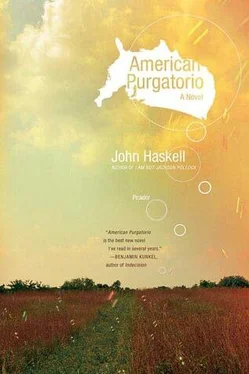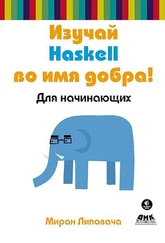John Haskell - American Purgatorio
Здесь есть возможность читать онлайн «John Haskell - American Purgatorio» весь текст электронной книги совершенно бесплатно (целиком полную версию без сокращений). В некоторых случаях можно слушать аудио, скачать через торрент в формате fb2 и присутствует краткое содержание. Год выпуска: 2006, Издательство: Picador, Жанр: Современная проза, на английском языке. Описание произведения, (предисловие) а так же отзывы посетителей доступны на портале библиотеки ЛибКат.
- Название:American Purgatorio
- Автор:
- Издательство:Picador
- Жанр:
- Год:2006
- ISBN:нет данных
- Рейтинг книги:3 / 5. Голосов: 1
-
Избранное:Добавить в избранное
- Отзывы:
-
Ваша оценка:
- 60
- 1
- 2
- 3
- 4
- 5
American Purgatorio: краткое содержание, описание и аннотация
Предлагаем к чтению аннотацию, описание, краткое содержание или предисловие (зависит от того, что написал сам автор книги «American Purgatorio»). Если вы не нашли необходимую информацию о книге — напишите в комментариях, мы постараемся отыскать её.
Los Angeles Times
American Purgatorio — читать онлайн бесплатно полную книгу (весь текст) целиком
Ниже представлен текст книги, разбитый по страницам. Система сохранения места последней прочитанной страницы, позволяет с удобством читать онлайн бесплатно книгу «American Purgatorio», без необходимости каждый раз заново искать на чём Вы остановились. Поставьте закладку, и сможете в любой момент перейти на страницу, на которой закончили чтение.
Интервал:
Закладка:
I’d given up the idea of calling my friends. I realized that I didn’t have any friends. All my friends were Anne’s friends. New York was part of another life. The memory of it lingered, a little, and one time, walking across the warm sand, I told Polino about my life with Anne.
But he was unsympathetic. “She’s gone, dude. Get over it.”
“Fine,” I said. “Whatever.” And even though I said “Whatever,” and even though I continued eating out of dumpsters, I refused, in my mind, to become part of Polino’s world. It was a pathetic world, I thought. Not my world, and yet all the time I thought I was resisting that world and the indolence of that world, I was succumbing. I needed to survive and that’s what I did.
I had a job, briefly. Polino, it turned out, never bothered to learn how to drive, and when a friend offered him a job driving someone in a car, I took it. I was to drive a girl — in her car — to a house. She was to go inside and I was to wait in the car and, in case of emergency, to come into the house, which I was assured would never be necessary. When the night of my job arrived I walked to the girl’s house. She was waiting for me, all business. “You don’t look too good,” she said, and although she told me I smelled bad, she let me drive her to the house where she had a massage appointment. She went into the house while I listened to the radio and watched the quiet residential street and the light from the streetlight shining on a nearby garden. When she came out of the house, about an hour later, she started yelling at me. She told me I was fired. “You’re too dirty,” she said. “It’s bad for my reputation.” I didn’t know what had happened. I would’ve argued my case, but I didn’t really care about my case. Why should I care? When she reached into her purse I told her to keep her money, which seemed to mollify her, and then I drove her home. I walked through the nighttime streets back to my makeshift shelter where I curled up with my blanket and listened to the humming of the air-conditioning machines.
Living on the edge of the continent, at the edge of society, I was feeling less and less connected to the world. I was pretty sure the massage girl had spoken to me, but whatever had happened between us, I was obviously of little consequence. I was more or less invisible. And when I say I didn’t care, it wasn’t specifically the incident with the girl. I cared about nothing. Or almost nothing. There was one thing, one small ember of desire still burning in me. Given a chance, I would have said that I wanted to be loved. But given the growing inconsequentiality of my life, and the fact that the girl hadn’t even recognized me as a living being, I was lowering my sights. I wanted to be loved, yes, but at this point it was enough to simply exist. It’s fine, I said to myself, and if it wasn’t completely fine, or perfectly fine, at least it was somewhat bearable.
Gradually I submitted to the way of Polino, the way of doing the least amount of anything. As I got used to eating garbage I let my disgust fade away, and it was liberating to do this. To surrender to the least resistance. That’s what I thought I was doing. Not fighting the world, or society, or the events of my life, but forgetting them. That’s what I thought.
5
One day Polino and I were walking down an alley off the main Mission Beach boulevard. We were talking about some girl Polino had seen, watching the people walk to the beach, and Polino told me he’d been married, so it surprised me when he then said, “Look, here come our dates.” I looked up as two girls were crossing the street in our direction. And just about as I saw them I felt this object hit me in the stomach. It was an avocado. A partially eaten avocado rolled onto the sidewalk and I looked up and saw a man running down the alley. Another man staggered up to us and said that his friend was drinking too much and didn’t know what he was doing. Well fine, I thought, okay, no problem. A drunk, right? What are you going to do?
I scraped the green mush off my shirt, looked up, and of course by then the girls had gone. I was standing there, talking with Polino, and I heard this “Hijo de puta.” I turned around and the avocado man was back. He was standing by a telephone pole saying, “Hijo de puta.” To me. “Hijo de puta, hijo de puta,” making an obscene gesture at me with his hand.
Okay. The man was drunk. So okay, we tried ignoring him. We tried to carry on a conversation, but “Hijo de puta, hijo de puta,” he kept saying it, and I didn’t know what it meant but this constant “Hijo de puta, hijo de puta,” whatever it was, was beginning to get to me. I thought I probably knew, more or less, what was right and what was wrong and what the man was doing wasn’t right.
“Hijo de puta, hijo de puta.” The man didn’t stop, he just kept pounding away and finally it snapped, or I snapped, and I took a few steps toward the man, to chase him away or teach him a lesson. Sometimes you have to use might in the service of justice, sometimes you just have to do something. I was thinking this as the man ran up the street.
Okay. Fine. Except the man came back. And he kept saying, over and over, “Hijo de puta, hijo de puta.” And I was going to chase him again but instead of that I thought, I can say it too, and I did. “Hijo de puta.”
And the man said it back. “Hijo de puta.”
I said it, and the man said it, Hijo de puta. Hijo de puta, back and forth, and the man was holding a flashlight, shining it toward me in the broad daylight, and even though it was having no effect, I wanted my own flashlight, to shine at him.
And right about at that moment I realized that I could have stepped back. I could have stepped away and seen the situation clearly. I could have stepped away from myself and just quit, just let go. I could have done that, but I didn’t. I felt that I was in this thing, that I was part of this hijo de puta, hijo de puta …
Desire is hard to get rid of. Even twisted desire, or especially twisted desire, like a weed, keeps coming up. By this time a crowd had gathered along the sides of the alley and a fat guy with a flag decal on his jacket back was urging me to “make the sucker eat shit.” And I was inclined to agree. They weren’t inciting me, but there I was, and there was this person, and somehow I felt trapped in the structure of this relationship we were creating.
That’s when I noticed, out of the corner of my eye, another man, a short man, standing by a redwood fence. He was saying, “Mira, mira,” and I didn’t see what he was referring to, or even think there was anything there to see. I’d seen everything I wanted to see, but the short man kept looking at me, and I thought he was talking to me, so I turned and looked around, and there was no way to know what he was trying to indicate, but what I saw when I looked made it all not matter. Walking up the street I saw the British guy from Kentucky.
It took a while for me to make the connection, a few seconds, and it might have been the beginning of hope, but I thought I’d had enough of hope. There was always hope and then inevitably the dissolution of that hope, and now I was just about done with hope. Except not quite.
I saw the man named Geoff, wearing a blue Hawaiian shirt, coming out of a sushi restaurant and walking alone up the street. I left Polino and the flashlight man, and followed Geoff, from a distance, following him around a corner and along a neatly manicured residential street named after a semiprecious stone. He crossed a street, walked into the next block, and went into one of the houses. I didn’t see which house exactly, but there were only a finite number of houses on the block and I imagined I’d know it when I came to it. And when I did come to it, there it was, sitting in the morning fog, a one-story bungalow with the two familiar cars parked, one in the driveway and one on the street.
Читать дальшеИнтервал:
Закладка:
Похожие книги на «American Purgatorio»
Представляем Вашему вниманию похожие книги на «American Purgatorio» списком для выбора. Мы отобрали схожую по названию и смыслу литературу в надежде предоставить читателям больше вариантов отыскать новые, интересные, ещё непрочитанные произведения.
Обсуждение, отзывы о книге «American Purgatorio» и просто собственные мнения читателей. Оставьте ваши комментарии, напишите, что Вы думаете о произведении, его смысле или главных героях. Укажите что конкретно понравилось, а что нет, и почему Вы так считаете.











